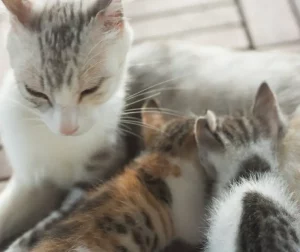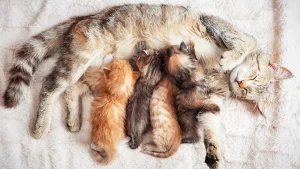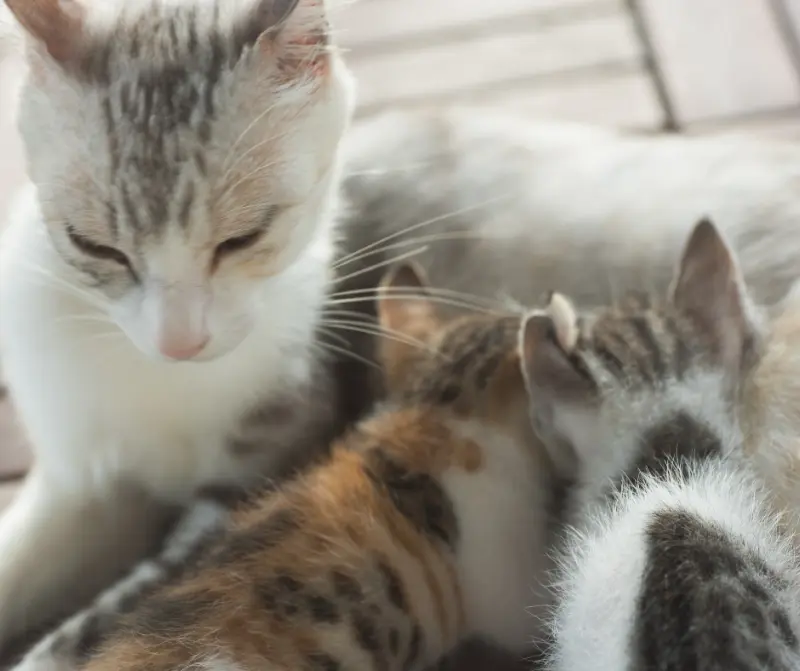As a cat owner, it is a wonderful experience to witness and be a part of your cat’s nursing journey. Nursing is a crucial time for a mother cat and her kittens, as they rely on her for nutrition and sustenance. However, if you notice that your cat has stopped producing milk or is producing less, it can be a cause for concern. In this article, we will explore effective ways to help improve your cat’s milk production and ensure the healthy growth of her kittens.

Understanding the Importance of Milk Production for Kittens
Newborn kittens are completely dependent on their mother for their nutritional needs. In the first several weeks of their lives, they cannot see, hear, or move properly, making them reliant on their mother’s milk for survival. Breast milk not only provides essential nutrients but also contains colostrum, an immune booster crucial for their early development.
When the mother cat is not producing enough milk, it can pose a danger to her young ones. Luckily, there are simple yet effective strategies to help improve your cat’s milk production. Let’s explore six of the best ways to support your lactating feline.
1. Nutrient-Dense Diet for cat
A well-balanced diet is the cornerstone of improving your cat’s milk production. During lactation, a mother cat needs more calories to provide nutrition for her growing kittens. It is recommended to feed her specially designed food for nursing cats, as it is packed with essential vitamins, minerals, and immune-boosting antioxidants. A lactating cat may eat up to four times her usual amount of food, and it’s not uncommon for her to still appear hungry afterward. Ensuring she receives a nutrient-dense diet will support her milk production and the overall health of her kittens.
2. Adequate Hydration
In addition to a higher caloric intake, a lactating cat also requires increased hydration. Cats obtain most of their moisture from their food, so it is important to provide them with plenty of wet food alongside dry kibble. This will help maintain their hydration levels and support milk production. Additionally, always ensure fresh, clean water is readily available for your cat at all times.
3. Goat’s Milk as an Alternative

While cow’s milk is not recommended for cats due to digestion difficulties, goat’s milk is usually well-tolerated by most felines. Goat’s milk contains less lactose, making it a suitable option for cats with lactose sensitivity. If your cat is particularly sensitive to lactose, you can dilute the goat’s milk with equal parts water. Goat’s milk is rich in essential vitamins and nutrients, which can provide a much-needed boost to your cat’s milk production.
4. Minimizing Stress Factors
Stress and anxiety can significantly impact a mother cat’s milk production. Creating a calm and safe environment for your cat is crucial during the nursing period. Ensure she has a quiet and secluded space where she can feel secure and away from excessive visitors or distractions. Keep other pets, such as dogs, and children away from her, especially in the first couple of weeks after giving birth. Reducing stress factors will contribute to a more relaxed and productive nursing experience.
5. Reglan (Metoclopramide) as a Supplement
Metoclopramide, commonly known as “Reglan,” is a medication primarily used to alleviate nausea. Interestingly, it can also be used to promote milk production in nursing cats. Metoclopramide acts as a dopamine antagonist, blocking dopamine receptors in the cat’s body. With reduced dopamine levels, the hormone prolactin, responsible for milk production, can be secreted more effectively. However, it is crucial to consult your veterinarian before administering any medication to your cat, especially while she is nursing.
6. Addressing Mastitis

If you observe that your cat is not producing enough milk and her kittens appear hungry, the issue may be related to mastitis. Mastitis is the inflammation of the cat’s mammary glands, which can result from constant scratching and suckling by the kittens. Swollen breasts may become blocked, inhibiting milk production. This condition is not only painful for the mother but can also hinder the feeding process. Gentle massage and the application of a warm, wet cloth may help alleviate blocked ducts. However, in severe cases, antibiotics may be necessary. If the swelling persists, it is advisable to consult a veterinarian for appropriate treatment.
Conclusion
The first eight weeks of a kitten’s life are crucial, as they rely on their mother’s milk for all their nutritional needs. If you notice a decline in your cat’s milk production, it is important to address the issue promptly. While the methods mentioned above often resolve the problem, it is essential to seek veterinary advice if the issue persists or worsens. By implementing these strategies, you can support your cat’s milk production and ensure the healthy growth and development of her kittens.
Additional Information:
-
Ensure your cat’s diet includes high-quality, protein-rich foods suitable for nursing mothers.
-
Regular veterinary check-ups during the nursing period are recommended to monitor your cat’s health and address any concerns.
-
Encourage your cat to nurse her kittens frequently, as this stimulates milk production.
-
Provide a comfortable and clean nesting area for your cat and her kittens to ensure their overall well-being.
